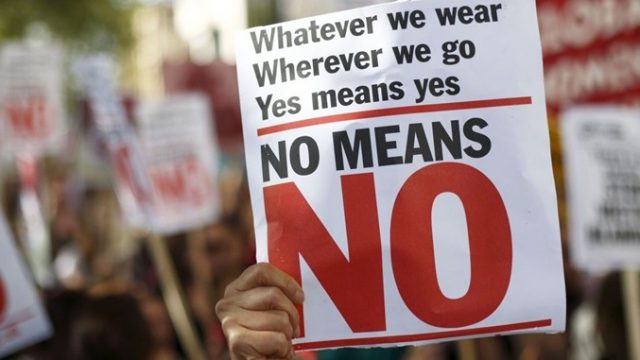College Students Don't Abide By "Yes Means Yes" Policies Because They're Dumb

Grace Lyden has an illuminating story about campus sexual assault policies. Illuminating because, after reading what many of the students Lyden interviews have to say, it’s clear that these policies are a waste of everybody’s time.
Nobody really expects that college students are going to stop at every stage of an intimate relationship and ask, specifically, to move ahead with more intimacy. It’s the sort of absurdist policy only college administrators and rabid feminist activists could love, and it’s actually counterproductive. The boundaries between consensual and nonconsensual sexual relations are serious stuff. But policies that make most college students roll their eyes, policies most college students of both sexes are going to disregard, make it seem unserious.
The people pushing these policies are operating at the same intellectual level as the proponents of abstinence-only sex education. I mean, sure, it would be nice if teenagers would wait until they’re adults to have sex, but c’mon. Let’s live in the real world.
What’s more these silly policies are born of overblown statistics about campus sexual assault which Lyden reports uncritically, despite an explicit warning on how the media should use these statistics.
Here’s what Lyden wrote:
College administrators hope the shift to “yes means yes” will reverse the alarming rate of sexual assault on campuses. A recent national survey found that more than one in five female undergraduates said they had been sexually assaulted in college.
Now here’s a direct statement from the survey of over 150,000 students at 27 American campuses conducted by the Association for American Universities: “[M]any news stories are focused on figures like ‘1 in 5’ in reporting victimization. As the researchers who generated this number have repeatedly said, the 1 in 5 number is for a few [institutions of higher education] and is not representative of anything outside of this frame.”
“The wide variation of rates across IHEs in the present study emphasizes the significance of this caveat,” the researchers continue.
[mks_pullquote align=”right” width=”300″ size=”24″ bg_color=”#ffffff” txt_color=”#000000″]What are we to make of students who simultaneously say they were sexually assaulted through harassment or physical force and also that they didn’t find these things serious enough to report? [/mks_pullquote]
In other words, the researchers are specifically warning reporters like Lyden not to use the 1 in 5 number as a brush with which to paint all American campuses. The campuses surveyed were not a representative sample of all universities. The students surveyed were not a representative sample of all students either. In fact, the researchers pointed out that the survey may over-represent victims of sexual assault.
“An analysis of the possibility the estimates were affected by non-response bias found that certain types of estimates may be too high because non-victims may have been less likely to participate,” they write.
Lyden reports that a survey shows that one in five female undergraduates say they have been sexually assault. But the researchers responsible for the survey say, explicitly, that this is not true. Lyden and the Fargo Forum owe us a correction, I think.
There are other problems in the survey too. “Nearly 60 percent of students who had responded to what researchers defined as sexual assault said they did not report the incident because they did not consider it serious enough,” Ashe Schow, writing for the Washington Examiner, reports. “Vast majorities of students gave this as the reason for individual classifications of assaults, including harassment (78.6 percent), sexual touching due to physical force (75.6 percent) and sexual touching due to incapacitation (74.1 percent).”
What are we to make of students who simultaneously say they were sexually assaulted through harassment or physical force and also that they didn’t find these things serious enough to report? That’s a topic ripe for more study before we go throwing around the “one in five women say they are sexually assaulted” line.
The study also classifies “sexual assault” as everything from an unwanted kissing or touching to forcible sodomoy. Which, you know, c’mon. If we’re putting an unwanted pat on the ass at a party (caddish behavior, to be sure) in the same category as non-consensual anal sex we’ve got a serious problem with the data.




